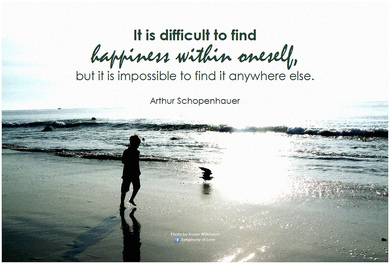 “As long as you think that the cause of your problem is “out there”—as long as you think that anyone or anything is responsible for your suffering—the situation is hopeless. It means that you are forever in the role of victim, that you’re suffering in paradise.” ― Byron Katie, Loving What Is: Four Questions That Can Change Your Life I have two scenarios for you to consider. In the first, you see a single mother. Her husband cheated on her for years. She is upbeat, she is happy and she goes through life smiling. She enjoys her children, yet she is able to enjoy the weekends they are with their father when she is able to do some adult things. She encourages her children to have a good relationship with their father and feels glad that they enjoy being with him. In the second, you see a single mother. Her husband cheated on her for years. She looks haggard, scowls and goes through life just trying to get through the day. Her children are a chore, but when they are with their father she resents that they are gone. When they have fun with him, she sees it as a betrayal of her. We all know people (women or men) who fit into each of these categories. How is it that some divorced people are able to have a sense of joy and ease about them while others seem to have the weight of the world bearing down on them? I believe that the difference lies in attitude. If you live as a victor, you will be a victor. If you live as a victim, you will be a victim. I believe if you empower yourself with the mindset of a victor and recognize it as a choice rather than a circumstance, the victim will fall off of you life like the chrysalis of a butterfly. The first action necessary to embrace the victor over victim mentality is to realize that you have control over your future. Whatever has happened in the past was difficult. The nature of divorce is difficulty. Once you accept that you are the only person who controls your destiny, you can let go of any resentment from past trials. The first step in controlling your own destiny is to relieve yourself from the burden of being invested in your ex. If you are invested in your ex’s behavior whether it relates to whom he dates or how he spends money, then it is difficult not to see a cause and effect relationship between what he does and how you feel. This is a two-fold problem. It leads to wanting to change his behavior (control), and it leads to thinking his behavior affects you (victim). The fact is, once you are divorced, you have no say in what your ex does, who he dates and how he spends his money. After all, you don’t want your ex to have a say in your decisions, right? To think that you have a say in your ex’s life is to try and maintain some degree of control over him. When you try to maintain control and realize you can’t, it invokes anger, frustration and resentment. These feelings lead to identifying yourself as a victim of your ex’s behavior. Let go of control. The knowledge and acceptance that you can only control yourself and what goes on at your house is liberating and empowering. The next step into victory is to re-learn how to communicate with your ex, particularly in the beginning. Sometimes old habits are hard to break, so in the first stages of separation and divorce, I recommend that you communicate only by email and only about topics specific to the children. These topics are health, schedules and the academic well-being of the children. This will eliminate the temptation to get into other conversations that may not be related to the children. Anything not related to the children is in opposition to you trying to become un-invested. Eventually things may evolve and communication may flow more easily, but in the beginning, when you are trying to re-learn how to think about yourself and your own goals, it is better not to drift into past habits and hurts. Next, practice the Golden Rule. If you behave as you would like your ex to behave, you do not create conflict. Conflict leads to negative communication and that keeps you invested in the anger and hurt of the past. If you are the custodial parent, make absolutely certain to provide your ex with schedules, school notices and information about your child necessary for your ex to participate in every way. If you are the non-custodial parent, make every effort to gather information about your child from readily available sources such as school websites, sports team websites, etc. Again, practice the Golden Rule by providing information as you would have it provided to you. Otherwise, you are provoking your ex which keeps you invested. Keep your focus on you, your kids and the future. When you take responsibility for your own feelings and actions, you are empowered to make changes and be happy. You are divorced from your ex. There are reasons for that. The reasons will probably not change. If you do not expect the reasons to change, and you can accept the way things are, your only option is to recognize that you and only you control your reaction to your circumstances. You and only you control your future. This is your victory. And this is the lesson to teach your kids. Empowering yourself to claim responsibility for your destiny and your happiness empowers your children to know they can choose happiness, too. And they will learn to choose to be victors of their own lives rather than victims. And that is the greatest victory of all.
2 Comments
 An amazing thing happens to most of us when we become parents. We change for the better. The gravity of the responsibility and the intensity of the love that we feel toward our children hits us in the heart, and we do everything we know how to do to nurture them. We become better people, trying to lead by example. Often we start eating healthier, working out more, going to church, wearing seat belts. Many times we quit cursing, smoking or driving fast. We are keenly aware of our behavior and the influence it has over our children because we see ourselves reflected in their cherubic little (or not so little) faces. And then, sometimes, divorces strikes. Divorce hurts. It angers. It scars. It can consume us to the point that it is difficult to remember that our every move, every word, every action is being recorded by the sponges that are our children’s minds, hearts and souls. To be in agony ourselves and to gather the strength to remember that we must put that agony aside for our children takes Herculean effort. Putting our children first during a divorce means putting aside our own anger, hurt, betrayal and sadness, particularly when directed at our ex-spouse, and putting the emotional needs of our children ahead of our own. Unless there are real and grave safety issues, everything must be done to preserve the relationships the children have with both parents. No matter what your ex did or how you feel about him/her, that person will always be your children’s parent. And that is okay. You are responsible for making it okay for your children to love that parent when they are around you. In eight years of being divorced, I have had a lot of practice in learning how to navigate co-parenting. There is no easy solution, but I have realized that, as bad as it can seem at the time, nothing is really the end of the world. This realization has helped me let go of control and anger and has helped me to make sure my children have a relationship with their father. I have recently remarried, and my husband and I must try to balance our children’s relationships with each other and with both of our former spouses. Here are some things we have learned along the way:
Going back and forth between homes is not your children’s fault and not their choice. Give them the freedom to be happy wherever they are. It is the greatest gift you can give to them after their family has broken. They will love you and respect you for allowing them their own relationships, their own feelings and their own time. So send them off with a smile and an “I can’t wait to hear all about it when you come back!”  It was Christmas Day. New just-played-with toys were scattered all over the house, wrapping paper was overflowing the trash cans, and the boys were still riding high from candy-filled stockings and the excitement of Santa’s visit. To keep things “normal,” I had asked my husband to sleep on the couch on Christmas Eve so that he could see the boys on Christmas morning. We had been separated since Halloween. He was the textbook adult child of alcoholics. He lied when the truth was easier, he was impulsive, self-loathing, non-communicative and more. I began to see these traits in my children and asked him to leave to get help so that we could break this cycle of his family. I knew that with help, and because I believed he was a good person, we would get through it. As he was leaving, I walked him out through the garage. “Can we talk?” he asked. “Hang on,” I said. The boys were two, four and six years old. I couldn’t leave them unattended for more than a few minutes. I opened the door to peer inside. Through the kitchen and into the living room, I saw the Christmas tree lights shimmering, the stockings flung on the floor, toys and candy strewn about. The smell of the tree hit me as I scanned the kitchen still covered with Christmas morning donuts and cookies. The boys were quietly playing. The middle one was watching a Christmas movie, the youngest was riding his new tractor and the oldest was playing his new video game. I turned back into the darkness of the garage and closed the door to see my husband sobbing. In ten years, I had never seen him cry. I looked around to see our life in the shadows. Christmas boxes were awaiting pick-up. Bikes, rakes and tools were haphazardly arranged. Boxes of outgrown clothes were awaiting the next boy’s growth spurt. “Ask me any questions you want,” he said. “I have decided to be completely honest and tell you everything.” “Have you ever cheated on me?” We had many problems, but nothing I believed was insurmountable. I always believed he was good person. He kept telling me he was a good person, and I wanted to believe it. I wanted to believe that when he “worked” until 10:00 at night and didn’t answer his phone for hours, that he really had left his phone in the bathroom. I wanted to believe that when he shut off the computer every time I walked into the room, he really had just finished using it. I wanted to believe that the excessive cash withdrawals from ATMs were for lunch. But these doubts prompted me, and the question came out of my mouth without a thought or hesitation. “Have you ever cheated on me?” “Um, well, not really,” he said. Not really? That was not a definitive answer to my question. That question should have a definitive answer, and at that moment, I knew. I felt invisible. Everything I knew to be true was a lie. As I listened to an endless description of what specific acts he believed constituted cheating, I felt as though I had left my body and was watching this scene from above myself. “Hang on.” I had to come back to myself and needed to check on the kids. I opened the door to check on the boys. They were getting a bit restless, running around the living room, flinging toys up in the air as they giggled and shrieked. Frosty the Snowman was blaring from the TV. My mind replayed the last week as I watched them. The Christmas Eve service at church, the Sunday School Christmas party, making cookies with my parents — all of it seemed so normal. I told them to finish the movie and I would give them a bath. When I turned back to the dimly lit garage, I began to ask questions with surreal calm. He started to sob harder and harder as he related a tale of infidelity spanning five years of our ten-year marriage. “Who?” “I don’t know,” he said. “What do you mean you don’t know?” I could not fathom his answer. “I don’t know who they are.” “How many?” “Too many to count.” At that moment, my two-year-old came bounding out of the house, all grins and wanting to play. The bright light of the kitchen fell on my husband’s tear-streaked face. I stepped to block my son from seeing him, scooped him up and carried him back inside. I asked my 6 year-old to play with him for a few minutes before their bath and I would be right back. “I don’t have any more questions,” I said. I turned back into the house filled with lights, music and the sweet faces of innocent, giggling boys and I shut the garage door. Between the Big Confession and the New Year, I felt a bizarre sense of calm and relief. I had a defining moment of clarity that made my decision to leave my husband definitive. I didn’t flail in the limbo of indecision. I had no doubts and no regrets. With my decision made, I felt a bizarre sense of elation. Elation in spite of the fact that my husband called crying daily, sent flowers regularly (too little too late? I mean, really, the lack of self-awareness boggles the mind), and finding that I was buried under a pile of months of unpaid bills. Telling my children about the divorce and seeing their devastated faces was the hardest thing I have ever done, however, I knew I was doing the right thing. Not everyone knows that and knowing is a gift. After the meeting with the lawyer on the first day he was available after the holidays, I went home. The Christmas decorations were still up looking haphazard and worn and the lights hadn’t been turned on in days. My children were with my mother. I cried harder than I have ever cried in my life. And then I got up, undecorated my house and went to get my children. I knew that my responsibility was for my children and myself. And I was free.  This is the article I wrote for the Huffington Post that inspired this website. Please comment with your thoughts. In my book, I talk a good bit about “those who fail to embrace their own reality.” These are the people who struggle with acceptance of their situations whether it is divorce, custody arrangements, employment, dating relationships or any other area of life. I believe that the ability not only to accept your situation, but to embrace it is the only way you can begin to set and follow your own path and to find sustainable happiness. What does it mean to embrace your reality? It means that you accept what is. It means you know who you are, where you are and what you want. It means you recognize that the only one who can make you happy is you. The only one who can change your life is you. That blame and anger only serve to defeat you, not the person you blame and have anger toward. Acknowledging your reality equates to having self-awareness. It is a big part of happiness because when you lack it, you are fighting against where you actually are in your life. You have to own your situation, because when you don’t, you cannot make effective change. And then you have to embrace it. The difference is important. Acknowledging your reality allows you to understand, embracing gives you the power to change. Let’s look at a few situations I have experienced and observed in the world of dating after divorce that taught me this lesson. 1. The guy who repeatedly said, “My wife, I mean ex-wife.” This guy has not accepted (much less embraced) the fact that he is divorced. How can he move forward? He can’t. He is stuck. 2. The guy who kept telling me what he lost in his divorce...his boat, his house, etc. He is still angry. He resents what happened. As long as he holds on to that, he can’t make change. And no one wants to be around someone who is angry and resentful. The power to change is thwarted when you embrace your anger rather than accept your now. 3. The guy whose profile listed his education as “college,” and upon meeting him answered a question about the nature of his degree with “technically, I didn’t finish college.” Why? Why misrepresent? You are who you are and if someone doesn’t like it, it is their problem. You have made it your problem by lying about it. 4. The woman who is so put upon by being a single mother that she feels entitled. “I am a single mother, so I should have...” Where is her power? Does anyone “deserve?” Or do you deserve what you work for when you take responsibility for your own life? 5. The woman who is so angry that she tells anyone who will listen about the wrong she feels was done to her. Where is her power? Is she allowing her perception to control her future relationships rather than being determined to make her own happiness? 6. The men and women who are victims of their own lives. If you believe that everything that happens in your life is “done to you,” you have effectively given your power away. Bad things happen. Often they are not your fault. But no matter whose fault they are, you have power in your reaction and in your determination to change your situation. If you are not happy, you are not choosing to make a change. I experienced a divorce in which someone else made decisions that changed the course of my entire life without consulting me. So believe me, I get feeling angry and frustrated by that. There is a time when you need to allow yourself to feel that anger and frustration and then heal. At this point, you are not a fully formed person. You are broken and need time to put yourself back together. The problem occurs when this brokenness becomes a way of life. When you cling to the anger and frustration as a crutch and as an excuse not to move forward and get out there and redefine your path. When I decided to embrace the fact that I was divorced, that I was raising three kids as a single mother, that I had to find a path that was very different from the one I had been on, I began to feel empowered. I could decide what was next. I could decide what kind of relationship I wanted. I was in charge. And I embraced that. And when I embraced that, good things began to happen. I love this phrase: If you don’t like where you are, move. You are not a tree. Words to live by. |
Details
Elizabeth DenhamAuthor, Relationship Expert, Humorist, Advocate of Finding Your Voice Archives
June 2022
Categories
All
Subscribe to BlogDon't miss out! Thank you!You have successfully joined our subscriber list. |
